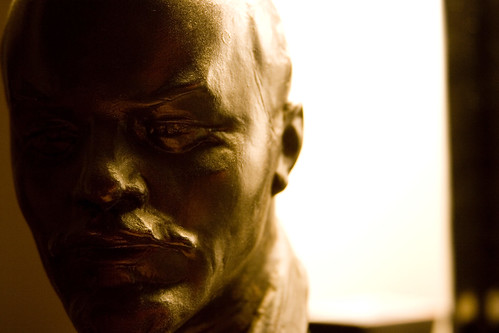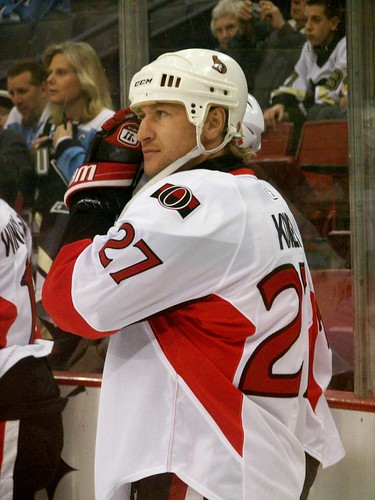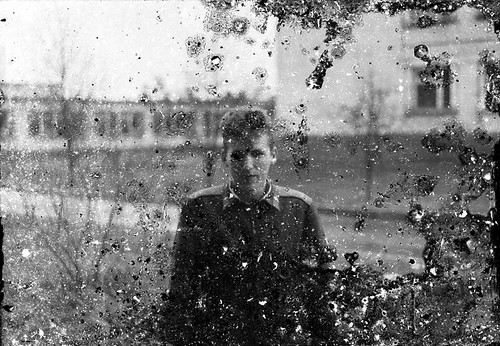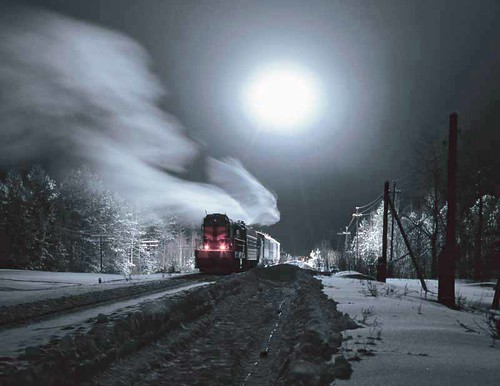“Russia is a riddle wrapped in a mystery inside an enigma.”
This quote would impress an intelligent high school senior.
It’s the most banal statement about Russia that a person can encounter, and I say this as a lover of quotes, an admirer of Winston Churchill and a student of the former Soviet Union. But, as boring as it is, the quote is useful for our purposes here because of how wrong Churchill was.
Russia is not a riddle or a mystery or an enigma.
In fact, the situation in Russia is quite simple: it’s a gangsters playground, partially populated by people who don’t seem to care all that much.
These gangsters have poisoned every conceivable enterprise in Russian society, including the increasingly obnoxious, and potentially threatening, Kontinental Hockey League (KHL).
Americans responded with a collective sigh of relief when the Soviet Union crumbled, and why wouldn’t we? “We aren’t going to be communists anymore” is always a good thing to hear an enemy say, isn’t it?
Not necessarily. Not when “we’re going to be gangsters now” is the next self-appointment.
We don’t have to worry about Russian ICBM’s launching from silos outside Moscow anymore, we just have to worry about jihadist governments conscripting disgruntled, Russian nuclear scientists. We don’t have to worry about Russian spies stealing our secrets as much as we have to worry about Russian journalists being murdered for daring to criticize the Putin-regime. And, of course, we don’t have to worry about Russian players taking jobs from North American players as much as we have to worry about losing Ilya Kovalchuk to SKA St. Petersburg and Pavel Datsyuk to CSKA Moscow.
The KHL may not be a “red menace” but it is a menace nonetheless.
While Alexei Kovalev, the frustrating wizard, has a history of making remarks that were not perfect representations of reality, his recent comments about the KHL are still interesting:
“Even if I was offered a role (to promote the Games), I wouldn’t take it. At this point, I want nothing to do with Russian hockey. There are a lot of people who come to the hockey world in Russia who don’t have any idea. It’s all family relationships: ‘I got this job, I can get you a job on this team, too,’ and that person doesn’t know anything about hockey. It’s pretty much if you get hurt in the KHL, you get traded or bought out. You expect that. They’re not developing players or teams, they’re running a business.”
When used in this context, the words “relationship” and “business” become dirty. Most fans, regardless of the sport they follow, are aware that teams can profit ENORMOUSLY regardless of their win-loss record. This is wrong and it’s dumb and if it what Kovalev says is true, “win at any cost” is not the mandate of the KHL. “Profit at any cost” is.
“But, Ian. Profiting isn’t synonymous with gangsterism, you stupid hippie,” you might be saying. No it isn’t, but consider what Rick Westhead, reporter for the Toronto Star, had to say about life, and death, in the KHL:
“The 18-year-old hockey phenom slumped over on the team bench.
If Alexei Cherapanov wasn’t dead, he would be in a matter of moments.
A first-round draft pick of the New York Rangers who was still playing with the Russian club Avangard Omsk, Cherapanov had suffered a fatal heart attack during the final moments of an Oct. 13, 2008, Continental Hockey League (KHL) game in Chekhov, a bedroom community south of Moscow.
Canadian Reid Simpson, a former NHL player who worked as Chekhov’s assistant general manager, sensed something was horribly wrong and scrambled from his team’s box seats down to the ice.
By the time he got there, Cherapanov’s body had already been taken outside and placed on the pavement. Dozens of spectators, smoking cigarettes, walked over and snapped photos on their cellphones of the lifeless teenager’s body.
Doctors were helpless. The hockey player was clearly dead, but that didn’t register with Nikolai, the Chekhov KHL team’s owner.
Nikolai, whose family name remains a mystery even to his own employees, burst through the emergency-room doors. “How can this happen? Bring him back,” Nikolai yelled at the doctors, according to Simpson.
The doctors understandably panicked.
Nikolai has a reputation for bringing a loaded gun into his team’s dressing room after a bad loss.”
“How can this happen? Bring him back,” is how a frantic tyrant reacts when he realizes that death is not obedient.
Change just a few words in this sad story, and Westhead could have easily been discussing the death of a player on the famed Red Army squad. In the Soviet Union, people, especially athletes, were servants of the state. In the Russian Federation, people, especially athletes, are servants of whoever pays them. After reading the account of Cherapanov’s death, does the word “servant” sound like an exaggeration? Does the word “gangster” sound like an exaggeration? Are people in Russia really treated any better now than they were under communist rule?
If this next slimy anecdote that Westhead offers is an accurate one, then KHL “ethics” are simply non-existent:
“One guy I know, playing for the KHL team in Kazan, was arrested after the team had (marijuana) planted on him,” says Simpson, who now lives in Chicago. “They took him to jail, wanted to sweat him out, pressure him to agree to go back to Canada without getting paid.”
It seems that a demotion to the minors, or the waiving of a contract, is not humiliating enough of an experience for an undesired player. In the KHL, as in the Soviet Union, only jail-time will do.
This final quote from Westhead’s piece (which I encourage readers to bookmark for he is a superior writer and has access to sources I do not) should make EVERYONE’s middle finger itch:
“How many players in the NHL are from Europe this year?” Fetisov asks. “Just 30 per cent now. Soon, (Europeans) will all come to the KHL, and the NHL will be left with the best players from North America only.”
The KHL can have Russians and Europeans of Fetisov’s caliber. His NHL career was unremarkable and he will be remembered by North American fans as the least interesting member of the “Russian Five.” But losing star players to the KHL, like we saw with Ilya Kovalchuk earlier this summer, is totally unacceptable.
How do we prevent Fetisov’s dream of thievery from manifesting?
Only a lawyer or a businessman could answer that question, and I am neither of those things, but perhaps we should consider the following: a player with NHL experience who signs a contract with a KHL club should be banned from returning to play in the National Hockey League.
Would this rule dissuade NHL players from going to Russia? Would this be an adoption of the same absolutism seen in the KHL? Would players say “I don’t care” and sign where they wanted to anyway? I raise this as an option simply to further an important discussion that needs to be had.
If there is a silver lining in this cross-pond chess match, it is that the league and the union now have a common enemy.
Union leadership surely wants to get top-dollar for the players, but what interest would they have in NHLPA members no longer playing in the NHL? I find it hard to believe that the union has become so cynical that its concern for a player ends when he signs a lucrative contract. I am unaware at how often the union uses the KHL as a bargaining chip, so I will not comment on that aspect. If the price for 25 years of labor peace is a rival, Russian league, so be it, but this is far from certain.
By studying history carefully, we can predict the future somewhat accurately, and history tells us that things in Russia collapse because of internal maladies. This is how the Soviet Union unmade itself, so hopefully, the KHL will meet a similar fate. The United States and The Soviet Union were engaged in a cold war for three generations. The National Hockey League and the Kontinental Hockey League have been engaged in a cold war for five years.
I am confident “we” will win, but “we” do not have three generations to work with.
Finally, since I have used 1,400 words to trash the KHL, and Russia in general, I feel I should provide some mitigation.
First off, my favorite players are Russian. They bring a distinct style and grace to the game. Sergei Fedorov was my childhood hero and I have a red “13” tattooed on my arm in honor of Pavel Datsyuk.
Beholding the “Russian Five” was one of the great privileges of my life as a hockey fan, and Detroit, my home team, would have NO Stanley Cups in recent history without the strong Russian presence that it had.
I also have a fondness for Russian composers, especially Prokofiev, and find the Russian language to have a complex, authoritative beauty to it.
When the U.S.A is eliminated from international tournaments, I typically hope for the Russians to capture gold. I have several USSR-themed tee-shirts to show my solidarity with Russian players, which, by the way, is morally problematic because the USSR really was an “evil empire.”
I am often mistaken for a person of Russian descent because of my appearance and am regularly teased for having hidden, anti-USA sentiments because of how much I love what Russian players have given us.
Anyone who knows me will say that all of this is true, and this is precisely why I ask: how can such brilliance and individual creativity come from such an oppressive and undemocratic place?
“Russia is a riddle wrapped in a mystery inside an enigma, Ian.”
I read Churchill’s words with different eyes after finishing this piece. Perhaps the quote is not so banal.







